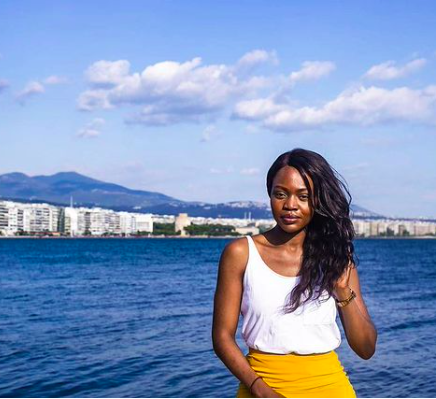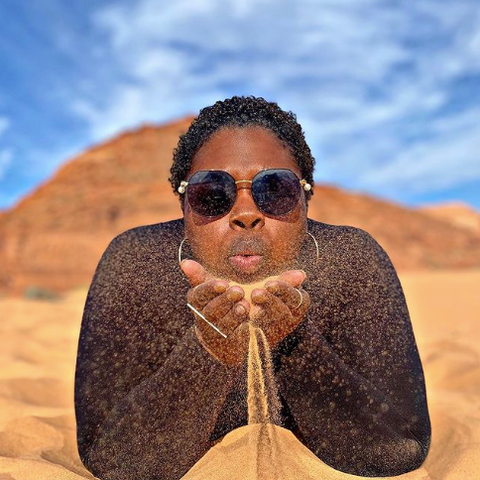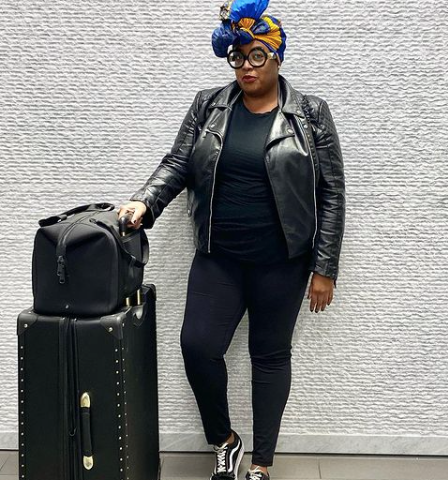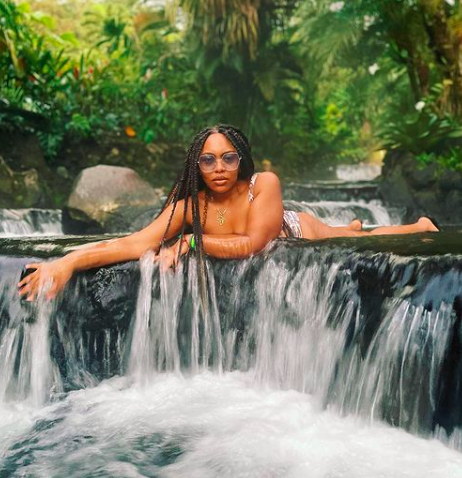13 FAQs + Tips about Black Female Travel Answered
- Franny the Traveler
- Feb 22, 2021
- 18 min read
Yassssss Queen!
You are catching those flights. You are taking those flicks for the gram. Your melanin is glowing as you lay on that white sand beach. You are living your best life.
I am putting that in the universe for you.
There is nothing like Black female travel! It is Black Girl Magic being sprinkled all over the world. However, it can come with a lot of pressure and even more concerns.
Is it safe to go here? How do I react if I experience racism or sexism? How do I take care of my hair or skin while abroad?
A part of society tries to brainwash us into thinking that travel is not for us -- whether it is out of fear or lack of representation. I am here to tell you: Don’t listen to those haters! As Black females, we not only belong in the travel space, we OWN it, too. Our $68 billion Black dollars is proof of that.
Whether you are an experienced Black female traveler, a novice, or a dreamer ready to take that first step, this is the blog post for you! I asked 20 of my fellow Black Travelistas to share their insights and tips on frequently asked questions such as “How have you navigated being a Black female traveler in countries where you’re the minority?” or “What tips do you have about Black hair care and Black skincare when traveling?”
You got questions, I got answers!
Table of Contents:
FAQ 1: What's been the best thing about traveling as a Black female? What’s been the hardest thing about traveling as a Black female?
Winter (left) & Sandra (right)
WINTER: The best and hardest thing about traveling as a Black female is sometimes feeling that you are exotic. This is the best because if I travel to a place, not only am I being introduced to a people or culture, I am also introducing them to my culture through every interaction. I also consider this the hardest because sometimes the way people interact makes me feel “other”. Maybe I don’t belong.
For example, on my trip to Southern Italy, I experienced both the best and the hardest. The best happened when I visited a local restaurant in the Old Town of Barletta with my Asian companion. We asked our server to bring us what he recommended. At the end of our meal, we met the manager and despite neither one of us speaking each other’s language, we had a very pleasant conversation. It was a unique experience and the best meal I’ve ever eaten while traveling internationally! The hardest part was being stared at by locals wherever I went, even throughout the duration of my flight back home. Being constantly stared at hearkened back to a time when exotic “human” exhibits were the rave in zoos across Europe. After a while, it is not a very comfortable feeling.
SANDRA: My personal experience traveling solo as a black woman has been extraordinary. I've been embraced everywhere I’ve gone. I’ve been traveling for over 30 years. I’ve been to over 60 countries. Some many times over (Jamaica, St Maarten, the Bahamas, and Aruba). I’ve never encountered a racist moment abroad.
I’ve had several encounters here in America. Especially in the south. Challenges have been language barriers and sometimes cultural adjustments. I’ve had to eat some things I didn’t like or want in order to not be disrespectful.
I suggest studying the language and culture before traveling. To read more about studying the language before travel, check out Learn the Language Before You Visit
FAQ 2: What do you look for or research in a destination before you visit as a Black female traveler?
Niqua (left) & Bisola (right)
NIQUA: Culture, food, history, and adventure is very important to me when I am looking for a destination to visit. Black culture is especially important as one of my main goals for visiting the US is to experience and learn more about us. Safety is also a top priority as well. I research locations and their surrounding areas, read reviews, calculate the distance between certain locations and transportation options
BISOLA: Personally, I research the general safety of the city and the areas to avoid. Every city, no matter how nice, always has areas that aren't as safe. Therefore, it's best to know where those are and avoid them, especially at night. I also research if there are any cultural norms or dress codes to adhere to. If I'm visiting a majority Muslim country, for example, then I would know to pack outfits that are less revealing to respect the culture there and reduce the chances of unwanted looks.
FAQ 3: Where have you experienced the biggest racism while traveling? How did you navigate that experience?
Ashley (left) & Sojourner (right)
ASHLEY: I've been extremely blessed to have not encountered "extreme" racism while traveling. At least it wasn't blatantly presented in my face. While living in Korea for three years, I had Koreans move away from me when I wanted to sit next to them on the bus or subway. There would also be a lot of staring and sometimes pointing. After a few months, I became numb to the staring and pointing. I learned to ignore it and walk with tunnel vision. During my first week in Korea, I was waiting at a bus stop with a Caucasian friend. A few older Korean women walked right up to me and started caressing my arm. My friend told them to stop in Korean; soon, I learned the phrase, "don't touch my hair" in Korean. These experiences definitely shocked me, unfortunately, it's a part of living in another country.
Connect with Ashley: Instagram
SOJOURNER: Thankfully, I haven’t had too many issues. However, one of the standout experiences was when I had to address the N-word when I was teaching abroad in Spain. This happened during a Thanksgiving lesson and a student named their turkey the N-word after he colored it brown. He was like 10 or something. I was really shocked so I had the co-teacher translate my explanation on why this was not okay since I could only speak in English in school. I thought that was the best way so I wouldn’t have to do double the emotional labor in English and Spanish.
FAQ 4: What are some tips you have to ensure safety as a Black female traveler?
Jo (left) & Franny (right)
Jo: One major tip I have to ensure safety as a black traveler would be to be aware of your surroundings. This tip transcends many areas of life, but especially when traveling as a woman. Since I travel a lot solo, one thing I am sure to do is book my accommodations in a well-populated area. If I’m staying at an Airbnb, I try to do the same. Areas near public transportation and landmarks are ideal places in order to ensure you aren’t too far off the grid.
FRANNY: One major tip I have is to make sure to download an offline version of a map. That can be from Google maps or the Maps app. This comes in clutch when service is spotty, you lose signal, or your phone dies. You do not want to end up in the middle of nowhere with no way to find your way back! Another tip is to post on social media strategically. As a person who travels solo a lot, I want to leave a social media trail so people know where I am just in case of any emergency. However, DO NOT post exactly where you are. For example, if you are at a specific restaurant in Rome, do not post the exact location of the restaurant while you are there. I know it may not feel as in the moment, but I always post it after I leave because there are stalkers out there!
FAQ 5: How have you navigated being a Black female traveler in countries where you’re the minority?
LaQuisha (left) & Dacia (right)
LAQUISHA: I wouldn’t be honest if I told you being a Black traveler has been difficult for me. It hasn’t been the horror stories I’m used to hearing. For me, being a Black traveler in countries that I’m not the majority has been fun. I say that because most people are turned off by stares. I just look at it as admiration. Maybe I’m weird. But those things don’t bother me...I’m too busy engulfing in the history and scenery.
Most importantly, I am also in awe at the mere fact that I am blessed to be in a new country and collecting these passport stamps. In fact, when I went to Egypt (December 2019), I had a custom made outfit for my pictures at the Pyramids of Giza.
I kid you not… So many people were taking pictures of me to the point that I stopped and posed for them. They were so shocked that I participated in the picture that they asked if they could take the picture with me. Interestingly enough, the same thing happened to me on my first trip to Dubai (March 2016).
So I just believe the good vibes follow me throughout the world.
DACIA: Short of visiting the African continent on separate occasions, I’m usually in the minority when traveling. I know my 6-foot tall self and long dreadlocks also make me stand out even more and on most trips, I am solo. However, it’s been my experience that most people are probably more curious than anything else. I usually get that ‘look’ like…am I real? I remember being in China visiting Shanghai and Beijing and they stared me down…HARD. But once I said a friendly “ni hao!”, then the locals smiled, which is usually a good sign. I do make an effort to learn a few phrases of the language for the area that I’m visiting so I don’t come across as the “ugly American”. Simple things like hello, how are you, excuse me, thank you, etc. go a long way in connecting. I always attempt to be respectful of the culture so I do my due diligence by researching in advance.
FAQ 6: What has been your experience of racism abroad? How do you navigate it?
Saundra (left) & Rondette (right)
SAUNDRA: I haven't really experienced racism in the countries that I visited. Not saying racism doesn't exist in those countries, it just hasn't been blatant in my face. Question 1 as I just thought about this and I don't know if that is racism or culture. As we were trying to navigate and see a city in China, we got stares, people coming up and snapping pictures of us, touching our hair, you name it...it happened. In some instances, I started taking pictures of them - some we turned our faces, and other times...we said 10 dollars for a picture with us!
Connect with Saundra: Instagram
RONDETTE: My experience with racism abroad has varied greatly, from the very subtle to the very overt. In some, or may I say most, instances it’s been clearly out of curiosity, intrigue, or lack of knowledge (example: a lot of my travel throughout China and whilst living in Hong Kong), but there have certainly been instances where I’ve felt profiled or discriminated against. To navigate, I try to first understand the lay of the land with where I am - I aim to understand, research and respect the culture of the country I’m visiting. Understand the customs in advance helps to demonstrate that I’ve visited with a level of wanted to learn more and invest the time to understand the culture - I often find this effort helps. However, when there are blatant acts of racism, I try my best to educate and dispel stereotypes if the person is open to it. If not, I happily go along my way. Life is too short to indulge ignorance.
FAQ 7: What has been your experience of racism traveling in the USA? How do you navigate it?
Kim (left) & Dacia (right)
KIM: Traveling in some areas of the South, I’ve come across Trump Country signs in Northwest GA. After seeing the signs, I make sure to not stop for gas or anything in those areas. I've gone on a group trip to a Cabin in the mountains in North, GA. We pulled into what was a vacant area in the neighborhood to get a good view of the sun setting. It was an area of grass that wasn't noted, or gated off. A White guy nearby comes out to tell us that he knows the owner of the land and that the owner wouldn't want people on his lot. We took that as code for "Black people" and went back to our rental I’ve been pulled over while traveling in NC, with the excuse of, “you weren’t wearing your seat belt”, which was a lie. I was upset and in my frustration explained to the cop that we had on our seat belts the entire time. I even pointed out the creases in a suit jacket from the seat belt. Looking back, I'm glad that it didn't escalate to something more since I was visibly frustrated.
DACIA: Of course the one incident was police-related -- just driving while Black. On one of my trips, I was driving from Oklahoma City to Little Rock, Arkansas one morning and had just crossed the state line. I saw the police car on the side of the road and within a minute, I was being pulled over. The young white sheriff claimed I was “too close” behind a large tractor-trailer. He made me get out of the rental car, thoroughly searched it, questioned me to no end, and ran a background check on me hoping to find some dirt. When he found absolutely nothing, he let me go. That was the only time I feared for my life because all I could think about was Sandra Bland and here I was a Black woman traveling alone in an unfamiliar area. I had a momentary breakdown in the car before driving off. I’m convinced that I was targeted because he went through all that effort and didn’t even give me a ticket considering he stopped me over a supposed traffic violation. Obviously, it was a slow morning in America. But for the most part, I’ve been fortunate to not have any major issues when on my travels. I think I said this before, but I feel like I was embraced in places where I initially questioned if I would be welcomed.
FAQ 8: How has your experience differed from traveling as a Black female in the USA vs. traveling while Black abroad?
Kim (left) & Naa Adei (right)
KIM: It varies based on the location. I feel more comfortable traveling abroad than I do in the States. While abroad, I still have to worry about safety, but I don’t have that nagging feeling that something can happen to me as I do in the States just for being Black. Traveling in some areas of the South, I’ve come across Trump Country signs in Northwest, GA. I’ve been pulled over while traveling in NC, with the excuse of, “you weren’t wearing your seat belt”, which was a lie. I’m not saying racism doesn’t occur abroad, but I’ve experienced it more while in the States. However, there are a lot of Gems in the U.S. For more information, check out her blog post, Black in America vs.Traveling While Black
NAA ADEI: Sadly, I usually feel more comfortable traveling abroad than I do in the States because people generally are more kind and just value human life a little bit more. Also, prior to the pandemic, people really idolized Americans and the American experience because we’re seen as the Land of Opportunity. But that’s all bullshit lol. Anywho, I feel like I have an American privilege that preceded any issues associated with my Blackness. There were times when I would hear the obvious microaggressions, and definitely be looked at differently, but those weren’t the norm at all. I’ve definitely been called Michelle Obama, and people have asked to take pictures with me. But I usually don’t spend too much time talking to strangers. Overall, though, I definitely feel more respected and embraced abroad. To read more about Naa Adei’s experience of traveling while Black, read her blog post and her editorial for TONL.
FAQ 9: How do you deal with family members and friends who have concerns of you traveling as a Black female?
Jennifer (left) & Kalyn (right)
JENNIFER: The majority of my family members encourage me to explore the world and try new things. They often tell me I inspire them to travel too. My mom loves the idea of me traveling but always seems to find the most ridiculous articles or news clips of killer dinosaurs or abominable snowmen to get me to stay home. I just laugh and book my trip. However, there are people who think that it's unsafe for me to travel, and don't want me to travel at all. The way I deal with it is... I don't! I literally don't listen to anything they say. I remember that these are the same people that have never left their neighborhood and don't understand the beauty of travel and they never will because they are so closed-minded.
KALYN: The person in my life who worries the most about my travels is my father, hands down. My dad is not as well-traveled as I am and growing up in a different, less inclusive time period, I understand his concerns. To bring him comfort, I try to educate him as much as possible on my travels, sharing my plans and the research I’ve done, sharing photos of various destinations, and then using facts: data & statistics. Oftentimes, American media portrays other countries in a negative lite and the reality is, I often feel safer and am statistically safer outside of the US- I reason with my dad, and any other friends/family members that have worries. I also try to persuade my dad, and some others, to travel with me, so they can see themselves, but this is still a work in progress!
FAQ 10: What is one piece of advice or words of encouragement you would offer to a Black female traveler who has concern about traveling?
Raqhelle (left) & Franny (right)
RAQHELLE: Fill your life with experiences, not things. The world is open and ready for you to explore it. I always say start small! Small experiences DO MATTER and as Franny emphasizes, those micro-actions are a perfect way to start traveling. You will always have fears or doubts about new places or trying new things but one of the best feelings is conquering those fears and doubts and just stepping out and doing it.
FRANNY: Get comfortable with being uncomfortable. There is an amazing world to see outside of that voice of fear or discomfort in your head. Change that voice to tell yourself “I am strong. I am powerful. I am unstoppable. I got this!” Traveling will allow you to spread your Black Girl Magic all over the world through travel — take up that space in a world we helped build! Also, realize that you are not alone in the discomfort. It is why there are so many Black travel groups on Facebook and Black female travelers on Instagram: we are a whole movement. Tap into those groups, those travelers, and their content as an excellent source of first-hand travel tips and travel guides. This blog post is a great starting point ;-).
FAQ 11: How do you find Black-owned businesses & culture when traveling, especially in places where it is not so obvious?
Naa Adei (left) & Ashlee (right)
NAA ADEI: I use the EatOkra app to find black restaurants that are listed in their directory. From there, I tend to look for stores that I would like or need if I were living in that city to see if there are other businesses around. This includes beauty salons, barbershops, and any local markets that serve Black and immigrant communities.
ASHLEE: I ask my followers, search Facebook groups, and Google “Black-owned businesses in (insert city)”. I also may ask someone I come across who may know more or who can lead me to someone who may know more. Ask and ye shall receive!
FAQ 12: What tips do you have about Black hair care and Black skin care when traveling abroad?
Francesca (left); Jessie (middle); Sojourner (right)
Francesca: When it comes to Black hair care, you always want to have a game plan when it comes to travel. Decide which style will be the most convenient for you, and prep for any potential wash days in advance. I also always make sure to bring my staple products with me, even if it's just a travel size for back up! As far as skincare, if you do nothing else, at least pack sunscreen! It's so important, especially during the summer and in hot climates. For more tips on traveling with natural hair, check out this blog post, “7 Essential Tips for Traveling with Curly Natural Hair."
Jessie: Braids and head wraps! I’m natural and I love the versatility and ease of braids or even crochet locs. They are easy to maintain for up to 4-6 weeks at a time and I bring a leave-in conditioner spray or ACV root rinse for a refresh of my scalp. I also like to use oils on my scalp for protection and care.
When I travel without braids and I don’t feel like doing a wash and go, I love wrapping my hair in a cute stylish head wrap. I watch Youtube videos on creative different ways to wrap. I prefer stretchy fabric because it’s easier to work with.
In terms of skincare, sunscreen and moisturizers are a must for travel. I wear sunscreen every day so I make sure to travel with my faves Black girl sunscreen and super goop. I also moisturize several times a day as planes and changes in temperatures tend to dry out my skin. I also like to travel with sheet face masks for some nice self-care and my hotel at night.
Connect with Jessie: Blog
Sojournies: Pack your hair products, weave, tools, etc. Hair is important to Black women, we know this. But, you may not know that our products aren’t everywhere. When you are preparing for your trip, pack the hair products you want or need with you. It is highly unlikely that your destination will have the shea butter, Flexi rods, Marley hair, or gel you are accustomed to using. This is especially true if you are traveling long-term. If you’re looking for a Black hair abroad packing list, I’ve got you covered here. Black hair care abroad is important, so don’t forget those headscarves too! For more information, check out 13 Top Tools and Hairstyles for Traveling with Natural Hair and A Conversation on Black Hair Care Abroad.
FAQ 13: How do you connect with other Black female travelers either online or when you are traveling?
Elise (left) & Franny (right)
ELISE: It’s generally easy to connect via social media, but when actually traveling, it’s not so easy lol. At times, I intentionally look for accounts that are similar to mine to follow (Black, solo travel/adventure) so I will look them up by hashtags usually! Or through the “follow list” of say, your account for example. There are no particular hashtags but something straight forward like #blackgirlstraveltoo #blacktravel #blackgirlswhotravel! Checking out pages like Travel Noire that feature Black travelers. To be completely honest, I have been on group trips almost every time that I have left the country and I have either been the only one or among one of two Black women (or men) out of maybe 14+ people. Soooo, I usually will connect with that other person. Generally, however, that’s about it. I do have some interest in going on a “Black group trip” in the future!
FRANNY: To connect with other Black female travelers online, Instagram and Facebook are my favorite platforms for different reasons. Instagram is helpful to connect with individual Black female travelers. I often find Black female travelers to follow through certain hashtags such as #blackgirlstraveltoo; #blackgirltravelslay; #blackandabroad; #blacktravelbloggers. Using those hashtags as well on my own posts also draws Black female travelers to my page. Furthermore, I follow Instagram accounts created to highlight Black travels, especially female travelers such as @queens_abroad; @blacktravelfeed; @blackgirlstraveltoo; @fatgirlstraveltoo; @fatgirlstraveling. When I see photos of Black female travelers that I am drawn to, I then click on their page, scroll through their feed (which usually leads me to like and comment), and follow them. The best way to connect is to interact on a consistent basis and build a relationship the same way you would with a friend or partner. Whether that is commenting on their posts or IG stories or having a conversation in the DMs, consistent interaction builds the best connection. It is how I was able to create this post!
When traveling in person, I will admit that this is something I have not had as much success with. As Elise stated, when I am on a group trip, I am usually one of the only Black women (or Black people) in general. When I am solo in another country, I often connect with locals regardless of race.



































































PAUTOTO
PAUTOTO
PAUTOTO
PAUTOTO
PAUTOTO
SUPTOGEL
SUPTOGEL
SUPTOGEL
SUPTOGEL
SUPTOGEL
BANTOGEL
BANTOGEL
BANTOGEL
BANTOGEL
BANTOGEL
GUATOGEL
GUATOGEL
GUATOGEL
GUATOGEL
GUATOGEL
LAMTOTO
LAMTOTO
LAMTOTO
LAMTOTO
LAMTOTO
LPG888
RAPTOTO
SlotGacorGuide
SlotGacorGuide
The Escorts in Karampura are not just beautiful women, but intelligent and cultured women to make the perfect companion for both business and pleasure.
Erek erek 2d lengkap
Buku mimpi erek erek
Erek erek togel terbaru
Cara curang togel online
Cara menang togel 4d
Trik menang togel
Rahasia curang togel
Cara jitu menang togel
Kode alam menang togel
Cara pasang angka agar menang
Freebet gratis terbaru
Freebet gratis tanpa deposit
Freebet tanpa syarat
Link freebet gratis
Freebet harian
Freebet langsung cair
Freebet gratis hari ini
Situs freebet terpercaya
Freebet gratis 2025
Freebet untuk togel
Syair Sgp hari ini
Syair Sgp jitu
Syair Sgp malam ini
Syair Sgp terbaru
Syair Sgp lengkap
Gambar syair Sgp
Syair Sgp kode alam
Syair Sgp bocoran
Syair Sgp angka main
Syair Sgp singapura
Syair Sdy hari ini
Syair Sdy lengkap
Prediksi bocoran Sdy
Syair Sdy terbaru
Syair Sdy jitu
porn
porn
porn
porn
porn
porn
porn
porn
porn
porn
porn
porn
porn
porn
porn
porn
porn
porn
porn
porn
porn
porn
porn
porn
porn
porn
porn
porn
porn
porn
porn
porn
PORN PORN PORN PORN PORN PORN PORN PORN PORN PORN PORN PORN PORN PORN PORN PORN PORN PORN PORN PORN PORN PORN PORN PORN PORN PORN PORN PORN PORN PORN PORN PORN PORN PORN